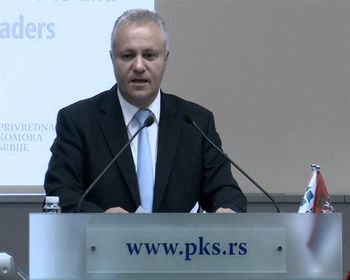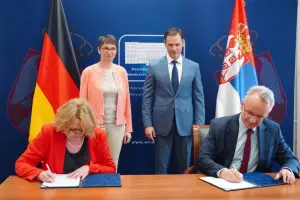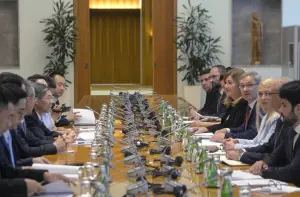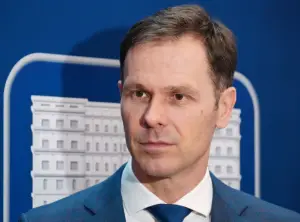Q:
A:
Plan of structural, medium-term reforms to be presented in one month
Belgrade,
20 September 2012
Minister of Finance and Economy Mladjan Dinkic said today that the state, in order to stop the growth of public debt, will be forced to sell some of its assets and thus finance the budget deficit.
On the second day of the Southeast Europe Management Forum themed: "Improving competitiveness of Southeast Europe: context, strategies, economic policies and the role of business leaders", held in the Serbian Chamber of Commerce, Dinkic said that the state-owned Electric Power Industry of Serbia will not be sold, but that in this area the programme of public-state partnership will be introduced.
He said that no other company that has a state monopoly will be sold such as, for example, the "Nikola Tesla" airport, adding that only the companies that have competition on the market and cannot keep up with modern technology will be sold.
The Minister of Finance and Economy announced that the period for the restructuring of companies will be restricted by law until 30 September 2014 and in the meantime the government will try to find strategic partners for some of those companies.
Dinkic said that the government should adopt at its session today the decision to get a loan worth €850 million from the Chinese Exim Bank for the construction of a motorway on Corridor 11.
He pointed out that building contracts should be signed by the end of this year or early next year so that works could start next year and added that this loan will finance the construction of a motorway from Belgrade to Ljig and from Pojate to Preljina.
Dinkic explained that the government decided to cooperate with China because of the good experiences on the construction of the Zemun – Borca bridge, and that these two motorways will be built 50% by Serbian construction workers and 50% by Chinese workers.
The Minister of Finance and Economy said he expects that by the end of the year Zelezara Smederevo steelworks will get a strategic partner and announced that next week the Serbian government will start talks with a Russian company on a strategic partnership in the steelworks and will ask for greater investment in higher quality products.
He emphasized that in order to exit the crisis, Serbia needs a combination of saving measures in order to prevent a public debt crisis and the strengthening of investment spending, since saving alone will not pull the country out of recession, but also an excessive personal spending would quickly drag Serbia into the public debt crisis.
To avoid this, it is essential that the current budget deficit, which is on an unsustainable level, be reduced to 3.5% of GDP in 2013 and continue to decline so that in 2015 it can reach the acceptable 1% of GDP, Dinkic underlined.
He said that the state of the economy which the new government found is really bad because Serbia has a double deficit, of the budget and foreign trade, high inflation and a fall in economic activity this year between 0.5% and 1%.
That is why the government will turn to different sources of financing the public debt and the sale of securities in the local market will be reduced to a minimum because that is the most expensive form of borrowing.
He underlined that the borrowing will be based on long-term loans from international financial institutions, and also on loans from countries such as Russia, China or some other, and the sale of Eurobonds will complement it.
The Minister of Finance and Economy said that a plan of structural and medium-term reforms for the improvement of the economic situation will be presented to the public in one month.
This plan will include everything proposed by economic experts, representatives of the International Monetary Fund and the World Bank.
According to him, this plan envisages the improvement of the investment climate through reforms in the areas of construction permits, urban planning and land registry, because in these fields Serbia is among the lowest-ranked countries in the world.
The plan also envisages the introduction of greater flexibility in the labour market and measures to discourage early retirement.
Dinkic said he is confident that with the publication of the medium-term plan, the interest rates on borrowing to Serbia will fall and noted that on the secondary market of Eurobonds, yields are already declining, specifying that these yields were 7.7% at the beginning of the year and yesterday 5.8%.
He added that this yield will drop with the decline in the budget deficit.
He said that no other company that has a state monopoly will be sold such as, for example, the "Nikola Tesla" airport, adding that only the companies that have competition on the market and cannot keep up with modern technology will be sold.
The Minister of Finance and Economy announced that the period for the restructuring of companies will be restricted by law until 30 September 2014 and in the meantime the government will try to find strategic partners for some of those companies.
Dinkic said that the government should adopt at its session today the decision to get a loan worth €850 million from the Chinese Exim Bank for the construction of a motorway on Corridor 11.
He pointed out that building contracts should be signed by the end of this year or early next year so that works could start next year and added that this loan will finance the construction of a motorway from Belgrade to Ljig and from Pojate to Preljina.
Dinkic explained that the government decided to cooperate with China because of the good experiences on the construction of the Zemun – Borca bridge, and that these two motorways will be built 50% by Serbian construction workers and 50% by Chinese workers.
The Minister of Finance and Economy said he expects that by the end of the year Zelezara Smederevo steelworks will get a strategic partner and announced that next week the Serbian government will start talks with a Russian company on a strategic partnership in the steelworks and will ask for greater investment in higher quality products.
He emphasized that in order to exit the crisis, Serbia needs a combination of saving measures in order to prevent a public debt crisis and the strengthening of investment spending, since saving alone will not pull the country out of recession, but also an excessive personal spending would quickly drag Serbia into the public debt crisis.
To avoid this, it is essential that the current budget deficit, which is on an unsustainable level, be reduced to 3.5% of GDP in 2013 and continue to decline so that in 2015 it can reach the acceptable 1% of GDP, Dinkic underlined.
He said that the state of the economy which the new government found is really bad because Serbia has a double deficit, of the budget and foreign trade, high inflation and a fall in economic activity this year between 0.5% and 1%.
That is why the government will turn to different sources of financing the public debt and the sale of securities in the local market will be reduced to a minimum because that is the most expensive form of borrowing.
He underlined that the borrowing will be based on long-term loans from international financial institutions, and also on loans from countries such as Russia, China or some other, and the sale of Eurobonds will complement it.
The Minister of Finance and Economy said that a plan of structural and medium-term reforms for the improvement of the economic situation will be presented to the public in one month.
This plan will include everything proposed by economic experts, representatives of the International Monetary Fund and the World Bank.
According to him, this plan envisages the improvement of the investment climate through reforms in the areas of construction permits, urban planning and land registry, because in these fields Serbia is among the lowest-ranked countries in the world.
The plan also envisages the introduction of greater flexibility in the labour market and measures to discourage early retirement.
Dinkic said he is confident that with the publication of the medium-term plan, the interest rates on borrowing to Serbia will fall and noted that on the secondary market of Eurobonds, yields are already declining, specifying that these yields were 7.7% at the beginning of the year and yesterday 5.8%.
He added that this yield will drop with the decline in the budget deficit.











